
There are times when I feel like I am trying to put the pieces of a puzzle together. I’m reading the news and something will catch my eye. I make a note of it and set it aside for later, not being sure where it goes just yet. It’s a big puzzle.
Such was the case when I saw a report a week ago about the likelihood of blackouts and other power failures this winter:
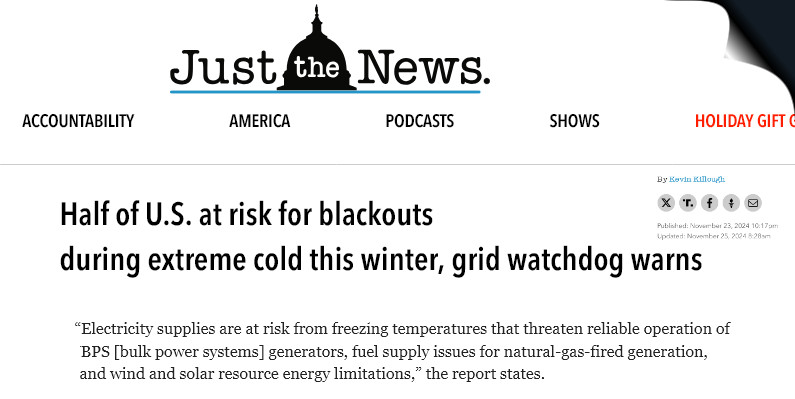
The article says: “A new report by the North American Electric Reliability Corporation (NERC), which assesses the United States and Canada’s grid reliability, finds that much of the central and eastern U.S. could experience blackouts should a significant and lasting cold snap descend on the nation. Electricity supplies are at risk from freezing temperatures that threaten reliable operation of BPS [bulk power systems] generators, fuel supply issues for natural-gas-fired generation, and wind and solar resource energy limitations.”
It goes on to explain a little of the why and how: increasing reliance on wind and solar power—to appease the climate lobby— while at the same time reducing output from coal fired plants has reduced energy supply and made our power grid more susceptible to seasonal fluctuations; pipe-line limitations to transport natural gas hinder the ability to make-up the gap resulting from reduced coal output; the Biden administration has done nothing to help US citizens to heat their homes while doing everything it can to propel pie-in-the-sky green energy boondoggles and further increase our dependence on foreign energy producers.
The lack of grid reliability is driven largely by growing electricity demand as well as the replacement of coal-fired and older natural gas-fired generators with energy-limited resources such as solar power. [Furthermore] Foreseeable extreme cold temperatures have the potential to push the existing natural gas supply infrastructure to maximum capacity,” the report warns.
Interesting. I filed the article away thinking it would be a good reference at some point for a related topic.
It only took four days.

On the 30th of November, another article appeared:
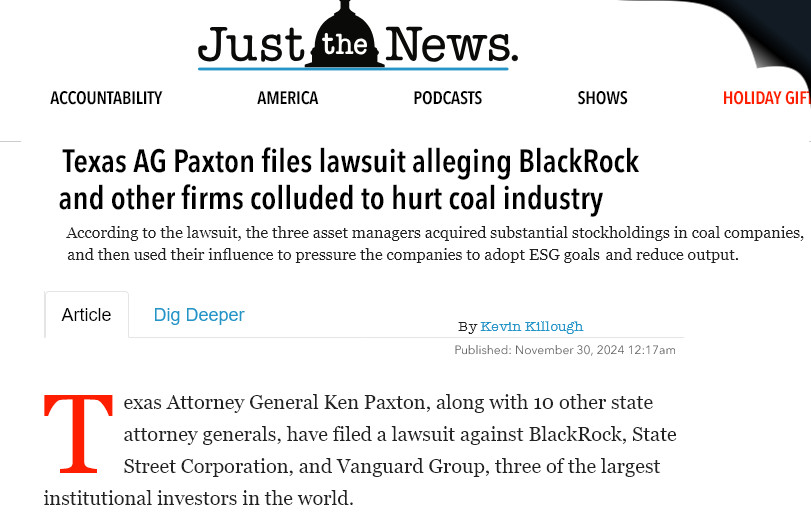
Eleven states have filed suit against “The Big Three”—BlackRock, State Street, and Vanguard— accusing them essentially of two things: suppressing coal production to drive up prices, and lying to their investors. In other words, thanks in part to BlackRock and their friends’ greed for profits, up to half of the country could be looking at blackouts this winter.
But before I get into the particulars of that, I first want to point out a curious fact: the eleven states in question are: Texas, Alabama, Arkansas, Indiana, Iowa, Kansas, Missouri, Montana, Nebraska, West Virginia, and Wyoming – all red states. In the 2024 election cycle, BlackRock donated nearly twice as much to Democratic Party candidates than Republican candidates. Though to be fair, they did donate to both parties: they’ll buy their candidates wherever they can get them. But it is interesting that not ONE Democratic controlled state is listed as a plaintiff. Likewise, the top-five recipients of funds from State Street were all Democrats, as were the top-four for Vanguard. I’m sure it’s just a coincidence.
Back to the lawsuit.
The opening of the official complaint sums it up nicely:
For the past four years, America’s coal producers have been responding not to the price signals of the free market, but to the commands of Larry Fink, BlackRock’s Chairman and CEO, and his fellow asset managers. As demand for the electricity Americans need to heat their homes and power their businesses has gone up, the supply of the coal used to generate that electricity has been artificially depressed—and the price has skyrocketed. Defendants have reaped the rewards of higher returns, higher fees, and higher profits, while American consumers have paid the price in higher utility bills and higher costs…Defendants effectively formed a syndicate and agreed to use their collective holdings of publicly traded coal companies to induce industry-wide output reductions…Defendants have immense influence over these companies on their own, but collectively Defendants possess a power to coerce management that is all but irresistible.

It is important to note that the SEC, the Securities and Exchange Commission, requires investors holding more than 5% control of a publicly traded corporation to undergo additional scrutiny because of the influence that investor may have on how the company conducts its business. With that 5% figure in mind, here is a list of the top coal producers in the United States, and the percentage owned by BlackRock, State Street, and Vanguard:
- Peabody Energy: 30.43%
- Arch Resources: 34.19%
- NACCO Industries: 10.85%
- CONSOL Energy: 28.97%
- Alpha Metallurgical Resources: 29.7%
- Vistra Energy: 24.94%
- Hallador Energy 8.3%
- Warrior Met Coal: 31.62%
- Black Hills Corporation: 32.87%
It is also important to note that the first two in the list, Peabody and Arch Resources, combined produce 30.4% of the coal in the United States.
And what do they do with this control?
“BlackRock has used the power conferred by its substantial shareholdings to influence and to coerce management at each of the Coal Companies to reduce their output of carbon and, by extension, of coal. BlackRock’s substantial shareholdings give it access to corporate boards and an ability to “engage” with management that ordinary shareholders simply do not possess. And should the velvet glove of engagement fail, the iron fist emerges. BlackRock can, and has, voted against management that has failed to yield to its demands. And, as BlackRock made clear in 2021, the threat that it might divest its holdings and drive down the price of a company’s shares remains always in the background. Another threat is voting out directors/forcing changes in senior management. To date, engagement and the use of its shares by proxy voting—with some high-profile votes to make examples of companies or officers—has proven adequate to the task of bringing about a coordinated reduction in the output of coal.”
BlackRock’s response is “We make these investments on behalf of our clients, and our focus is on delivering them financial returns.” The company spokesperson also said the company investing money in companies with the goal of harming them “defies common sense.”
But this is, frankly, bullshit.
They’re getting to eat their cake and have it too. Harming the public good by deliberately reducing coal supplies actually improves their bottom line in two ways. First, consider the stock value of coal producer Peabody, of which BlackRock is the majority shareholder: when Sleepy Joe and The Kackler took control and initiated, primarily via executive order, a reduction in American energy production and a shift to so-called “green” power, the share price was $3.57. Now, thanks to reduced production and the inability of “green” power to take up the slack, the share price is $28.70. In increase of 703%!
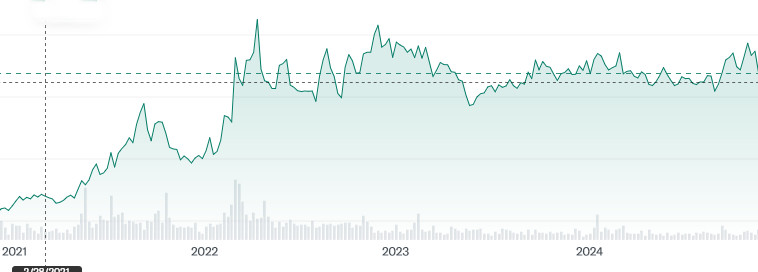
So, when BlackRock says it would defy common sense to harm the coal production industry or cripple output, they are talking out the side of their mouth: it’s basic supply-and-demand economics: maintaining (or increasing) demand while reducing supply drives prices, and profits, up.
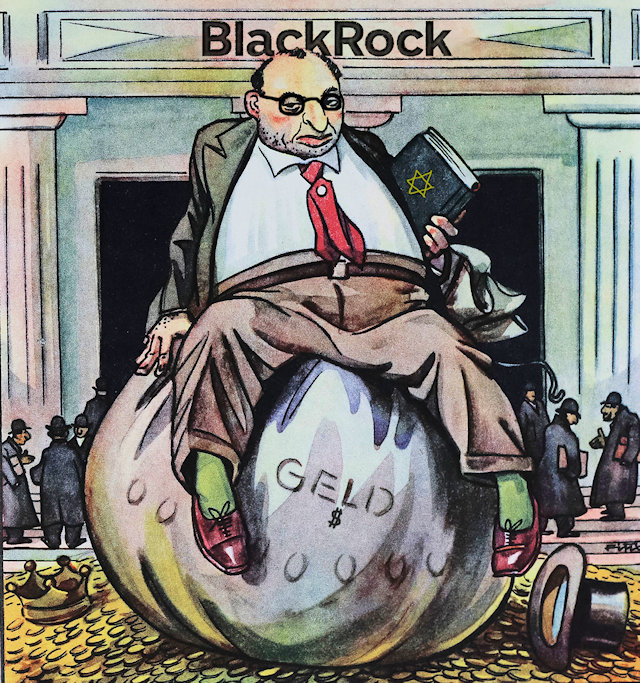
But wait, there’s more: they’re also playing both sides against each other. The other way decreasing coal production helps BlackRock is simple: they own the alternatives. If coal production goes down, energy must come from somewhere. As the complaint states: “[BlackRock et al] own substantial interests not only in domestic thermal coal producers but in competitors to thermal coal like natural gas and alternative energy. Indeed, BlackRock alone has invested $170 billion in U.S. energy companies—including oil and gas producers, alternative energy producers, and pipeline operators. Vanguard, BlackRock, and State Street are the three largest shareholders of Exxon Mobil, Chevron, Devon Energy, First Solar, and NextEra Energy…
These companies—and by extension their shareholders, including Defendants—would all benefit from eliminating lower-cost alternative energy sources.” Lower cost alternative energy sources such as coal.
Will anything come of the lawsuit? Your guess is as good as mine. But if I were a betting man, I’d keep a flashlight handy for when the power goes out this winter.

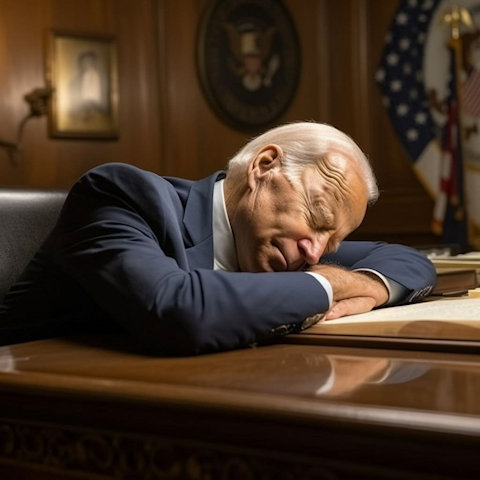
Finally, as an example how the Big Three play- and profit- from both sides, it appears they are drinking from the public trough as much as they can before the administration changes. The Sleepy Joe administration just granted a $6.6 Billion loan to EV automaker Rivian. Rivian is a publicly traded corporation, evidently unable to raise it’s own funds. I’ll give you three guesses who some of the largest institutional shareholders holders of Rivian are, but you’ll only need one: Vanguard (2nd largest) BlackRock (4th largest) and State Street (8th largest). Amazon is first. So why exactly they need government loans is beyond my understanding. But note: BlackRock and their cronies control both the fuel to make the electricity, and have a substantial stake in the products that consume it, all while being propped-up with your tax dollars.
The National Socialist solution:
As a counter-point to all this, it is worth mentioning the ANP’s position, as it is really quite simple: energy independence. We have enough resources and enough innovative potential in this country to completely forego dependence on foreign imports. The ANP is also in favor of phasing out coal and other forms of polluting energy, a clean environment being fundamentally necessary to the health and well-being of the Volk, but not at the expense of the American Worker being unable to heat his home, and certainly not to feather the already over-stuffed nests of effete globalists. The ANP calls for energy innovation, not market manipulation.
Conclusion:
Like I said, it’s a big puzzle. The destruction of the rail system as noted in a previous post, and the impact that has on our industrial capacity, is one piece. The inability to heat our homes reliably is another piece. The use of the “climate change” canard to justify harmful legislation and egregious corporate behavior fits in there too. Unfettered immigration from third-world countries into the heart of White homelands both European and American is another.
As the pieces come together, the picture that is emerging is one of globalism run-amok, managed by the wealthy few, for the benefit of the elite, at the expense of everyone else. In their world, America is just a company town: and they control…everything.
Stay aware, and stay warm.
Amerika Erwache!
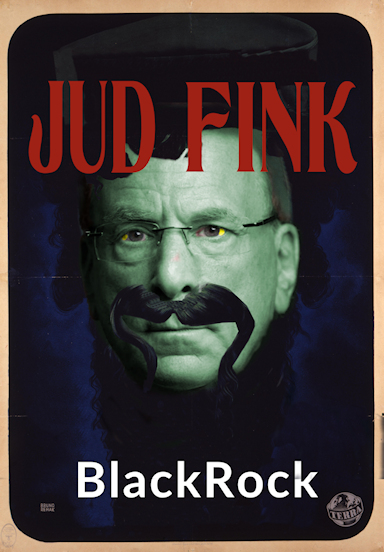


Leave a Reply